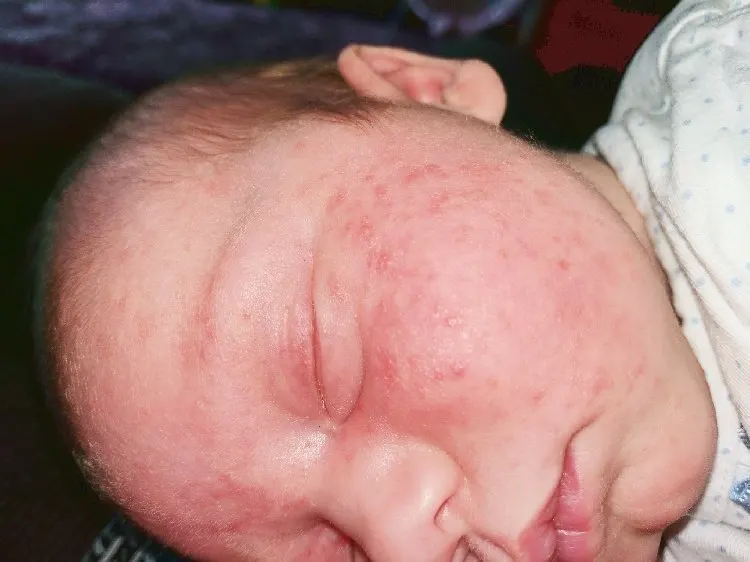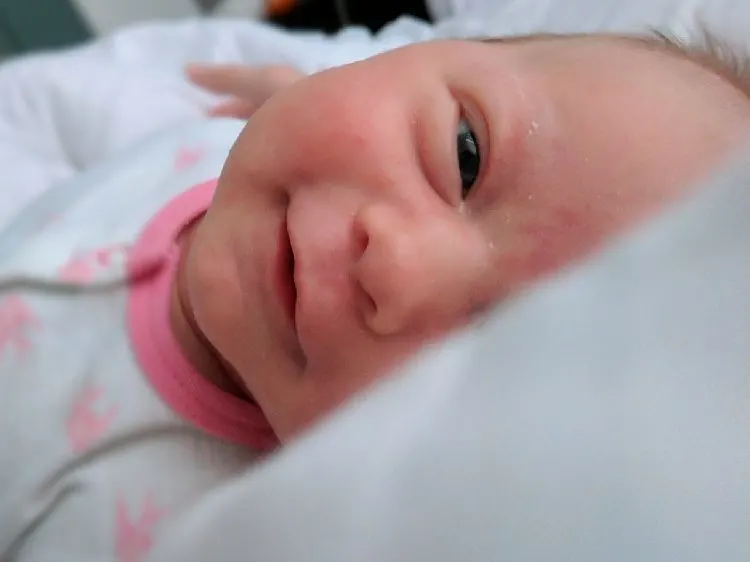If you’re concerned that your baby may have cow’s milk allergy, then it’s entirely natural that your mind would turn to a diagnosis so that you can begin to improve the situation for your child. In this post I’m going to talk about baby allergy testing, specifically CMPA allergy testing, as well as how to confirm CMPA by eliminating dairy while breastfeeding. But firstly, is there a test for CMPA?

Note the information here is from my perspective as a mother who has lived through allergies while breastfeeding my daughter, and should not replace the advice of a health care professional. For further CMPA advice from the NHS, go here.
Is There a Test For CMPA?
Unfortunately, despite what you may hear or what unscrupulous organisations may try to sell, there is no reliable CMPA test available.
Actually, that’s not quite accurate; the difficulty is that there are two different types of cow’s milk allergy, and while there’s a test that can identify one, it would result in a false negative for the other. Of course when you’re worried about your infant, this is really not helpful.

First I’ll explain the difference between the two types of allergy, and then I’ll give more information about how to confirm CMPA with a more reliable method.
IgE Mediated and Non-IgE Mediated CMPA
If your baby has a cow’s milk allergy, they may be suffering with an IgE mediated allergy or a non-IgE mediated allergy.
IgE mediated allergy results in an immediate reaction, such as hives or a milk rash, while non-IgE mediated allergies have a delayed reaction, such as gastrointestinal symptoms or an acne type rash developing on the face.

CMPA allergy testing would pick up an IgE mediated allergy, but a non-IgE mediated allergy would produce a negative result, when in reality your baby might be suffering with a genuine allergy – but the type that isn’t detectable by a test.
Baby allergy testing is also not usually conducted on babies younger than 6 months, which is unhelpful when your infant is clearly in discomfort and potentially suffering more serious symptoms such as poor weight gain.
CMPA Allergy Testing & Why You Should Be Cautious
If you’re still interested in baby allergy testing despite its limitations, there are skin prick tests (SPT) or blood tests available.
If you Google these tests you’ll find plenty of compelling information about them.
Be aware of what sites you are clicking for information – the vast majority will be trying to sell you something.

How to Confirm CMPA Without Baby Allergy Testing: Eliminating Dairy While Breastfeeding
If you wish to confirm an allergy in your baby without resorting to inaccurate baby allergy testing, or CMPA testing, then I highly recommend an elimination diet; this is the gold standard when it comes to how to confirm CMPA.
An elimination diet essentially means omitting the suspected allergen from the diet, and observing how the baby responds.
Be aware that it takes around three weeks for dairy to fully leave your system, and another three weeks for it to leave your baby’s. With this in mind you’ll need to completely eliminate it from your diet for six weeks before evaluating the results.

Confirming Cow’s Milk Allergy Without a CMPA Test
If dairy is the culprit, you’ll likely see a drastic improvement within just three or so days. If your baby’s symptoms stop after six weeks, then you can safely presume a diagnosis of CMPA.
Note: around 10% of CMPA babies will also suffer with a soya allergy.
If you wish to confirm each, you’ll need to do individual elimination diets for each. Alternatively, you may wish to simply eliminate both, however this may be unnecessarily restrictive for your diet.
Once you’ve confirmed CMPA then you’ll need to continue to eliminate dairy (and and other confirmed allergens) from your diet if you’re breastfeeding, or use a special formula which is not dairy or soya based. This can be prescribed by your GP if required.
For further CMPA support, the following may be helpful:
